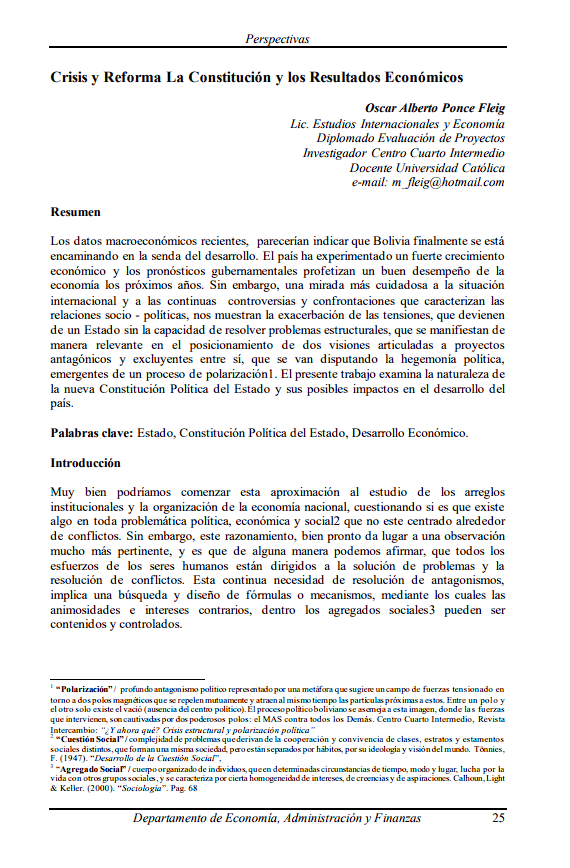Crisis and reform: the Constitution and economic outcomes.
DOI:
https://doi.org/10.35319/cp7js753Keywords:
State, Political Constitution of the State, Economic DevelopmentAbstract
Recent macroeconomic data seem to indicate that Bolivia is finally moving toward the path of development. The country has experienced strong economic growth, and government forecasts predict good economic performance in the coming years. However, a closer look at the international situation and the ongoing controversies and confrontations that characterize socio-political relations reveal an exacerbation of tensions stemming from a state unable to solve structural problems. These tensions are notably manifested in the positioning of two opposing and mutually exclusive visions that compete for political hegemony, emerging from a process of polarization. This paper examines the nature of the new Political Constitution of the State and its possible impacts on the country's development.
Downloads
References
ACEMOGLU, Daron; JOHNSON, Simon (2005). “Unbundling Institutions”, Journal of Political Economy, vol. 113 (octubre), Washington, págs. 949–95.
ASAMBLEA CONSTITUYENTE (2008). Constitución Política del Estado: Aprobada en Grande y Revisión, Editorial U.P.S., La Paz – Bolivia.
BALLIVIAN CALDERÓN, René (1979). Economía de Mercado y Economía Dirigida, Los Amigos del Libro, La Paz – Bolivia.
BOENINGER, Edgardo (1991). “Governance and Development: Issues and Constraints”, Proceedings of the World Bank Annual Conference on Development Economics, Washington, págs. 267–287.
BUCHANAN, James; TULLOCK, Gordon (1962). The Calculus of Consent, University of Michigan Press, Ann Arbor.
CENTRO CUARTO INTERMEDIO (2008). Revista Intercambio: “¿Y ahora qué? Crisis estructural y polarización política”, Segunda Época, Año VI, Nº 15, Cochabamba – Bolivia.
CORTÉS, M. Gabriel (1998). Principios de Economía Política, Ariel Economía, Barcelona.
DORNBUSCH, Rudiger (1990). “Policies to Move from Stabilization to Growth”, Proceedings of the World Bank Annual Conference on Development Economics, Washington, págs. 19–48.
HEILBRONER, Robert L. (1985). The Nature and Logic of Capitalism, W.W. Norton & Company, New York.
INDARRAZ, Benigno; ZARZA, Alberto (1986). Curso de Derecho Constitucional y Administrativo, Ediciones Macchi, Buenos Aires.
KIRCHNER, Alicia; VESSVESSIAN, Paola (2001). En Busca de un Ordenador Social, Editorial Espacio, Buenos Aires.
KNUT, Wicksell (1964). Lectures on Political Economy, Routledge and Kegan, London – U.K.
KRUGMAN, Paul (1992). “Toward a Counter–Counterrevolution in Development Theory”, Proceedings of the World Bank Annual Conference on Development Economics, Washington, págs. 15–38.
LASSWELL, Harold D. (1958). Politics: Who Gets What, When, How, World Publishing Company, New York.
NORTH, Douglas (1990). Institutions, Institutional Change and Economic Performance, Cambridge University Press, New York.
PRZEWORSKI, Adam (1993). “Democracy and the Market”, Trimestre Económico, julio–septiembre, Fondo de Cultura Económica, México.
SOWELL, Thomas (1985). Marxism: Philosophy and Economics, Quill William Morrow, New York.
STIGLITZ, Joseph E. (2000). La Economía del Sector Público, Antoni Bosch Editor, New York, Columbia University Press.
TÖNNIES, Ferdinand (1947). Desarrollo de la Cuestión Social, Editorial Labor, Barcelona.
TRIGO, Ciro Félix (1951). Derecho Constitucional Boliviano, Editorial Cruz del Sur, La Paz – Bolivia.

Downloads
Published
Issue
Section
License
Copyright (c) 2009 Revista Perspectivas

This work is licensed under a Creative Commons Attribution-NonCommercial-ShareAlike 4.0 International License.
La Revista Perspectivas de la Universidad Católica Boliviana, es una revista de acceso abierto, por lo tanto, es de libre acceso en su integridad. Está permitida su lectura, búsqueda, descarga, distribución y reutilización legal en cualquier tipo de soporte únicamente para fines no comerciales, siempre y cuando la obra sea debidamente citada.




